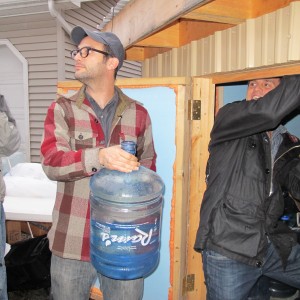Dimock resident takes the stand against Cabot Oil and Gas

Matt Rourke / Associated Press
Ray Kemble of Dimock, displays a jug of what he identifies as his contaminated well water in this August 2013 file photo. Cabot Oil and Gas is now in federal court defending itself against two Dimock families. The EPA included Dimock as a case study in its recent fracking report.
Scott Ely has lived his entire life in the rural area of Susquehanna County that has made Cabot Oil and Gas one of the most successful drillers in Pennsylvania’s Marcellus Shale. The region surrounding Dimock is what’s known as the “sweet spot,” breaking records with gushing shale gas wells and spurring an upswing in interstate pipeline construction. But along with volumes of gas, the company’s presence in the community since the dawn of the state’s shale gas boom has been fractious, and the highly publicized issues over water contamination helped create the modern-day anti-fracking movement.
Scott Ely, along with his wife Monica Marta-Ely and their tenants Ray and Victoria Hubert, are two of about a dozen families along Carter Road who have been engaged in an often hostile and bitter battle with one of the state’s largest drillers since 2009. The Ely’s and the Huberts are the only residents left in a lawsuit that has been slowly making its way through the court system for six years. The rest of the families settled with Cabot Oil and Gas and signed non-disclosure agreements.
Ely is the lead plaintiff in the case and also the first witness to take the stand Tuesday in U.S. District Court in Scranton before a jury of five women and five men with U.S. District Chief Magistrate Judge Martin C. Carlson presiding. Before any testimony could begin however, attorneys for Cabot complained that the anti-drilling activist Craig Stevens was “walking around outside with a bottle of brown water.” This led Judge Carlson to ban from the courthouse all “turbid water containers.”
Ely did, however, get to describe his current well water to the jury. “Brown,” he said, “brown and full of gas.”
Ely testified that while working for the Cabot owned company Gas Drilling Services, from 2008 to the end of 2009, he witnessed what his attorney Leslie Lewis described as a “reckless rush to drill.” He was hired on to operate a bulldozer clearing trees, moving land and building service roads. Ely says he eventually began helping assemble the drill rigs, which are used to cut through ground and rock to construct the well bore.
“We were in a competition to see who could drill the hole faster,” he said. “We would try to go as quickly as we could. I was on two to three sites a day. It was a quick, fast process. In and out, in and out.”
“We had diesel fuel spills, acid spills. There was flowback onto the bank,” he said. On one occasion, he described tearing the lining of the waste water pond himself with a backhoe after he was instructed to stir the contents. Although he didn’t testify as to what the contents were, he said the fluid went directly into the ground. During testimony Ely also said the first inkling he had of how these drilling practices connected to his own water supply occurred when his children developed headaches and rashes.
The original lawsuit included personal injury and fraud, but those claims have been dismissed for lack of evidence. And there is no evidence to be presented on any cancer-causing toxins in the water, or practices involving horizontal, slick water hydraulic fracturing, often referred to as fracking. The claims surround high methane levels in the Ely and Hubert water supplies, which the plaintiffs, and the Department of Environmental Protection, say were caused by Cabot’s drilling operations.
The plaintiffs’ case has been whittled down to just two issues, nuisance and property claims. The jury has to decide whether Cabot was negligent in their drilling practices and if so, whether the company made life for the residents bad enough they deserve compensation.

Susan Phillips / StateImpact Pennsylvania
Filmmaker Josh Fox helps deliver fresh water to Dimock residents. Fox's documentary Gasland put the town's water problems in the national spotlight.
Although the Pennsylvania Department of Environmental Protection found Cabot responsible for contaminating Dimock’s water supply through faulty well casing construction, the company continues to insist it’s not at fault.
Cabot’s attorney Stephen Dillard told the jury the contents of the Ely and Hubert water was naturally occurring and existed before the company began drilling. He said aside from the presence of bacteria, which no one links to gas drilling, the water is safe to drink, and that the scientific evidence will back this up.
“The dots do not connect between the gas wells and the water wells,” he said in his opening statement to the jury.
Dillard also told the jury that the company had offered a treatment system to the families, but it was rejected by the Ely’s and the Huberts.
Ely later testified that he didn’t accept the filtration system because he didn’t believe it would work.
Currently, Ely said he trucks in water from Montrose, about a 17 mile round trip that he has to do six times in order to fill his 3,000 gallon underground water storage tank the family uses for bathing and cooking. He said he buys bottled drinking water.
“Every winter is a disaster,” he says. “It’s nightmarish.”
The Department of Environmental Protection continues to bar Cabot from drilling in a nine square mile area of Susquehanna County. The trial is expected to last several weeks.
















